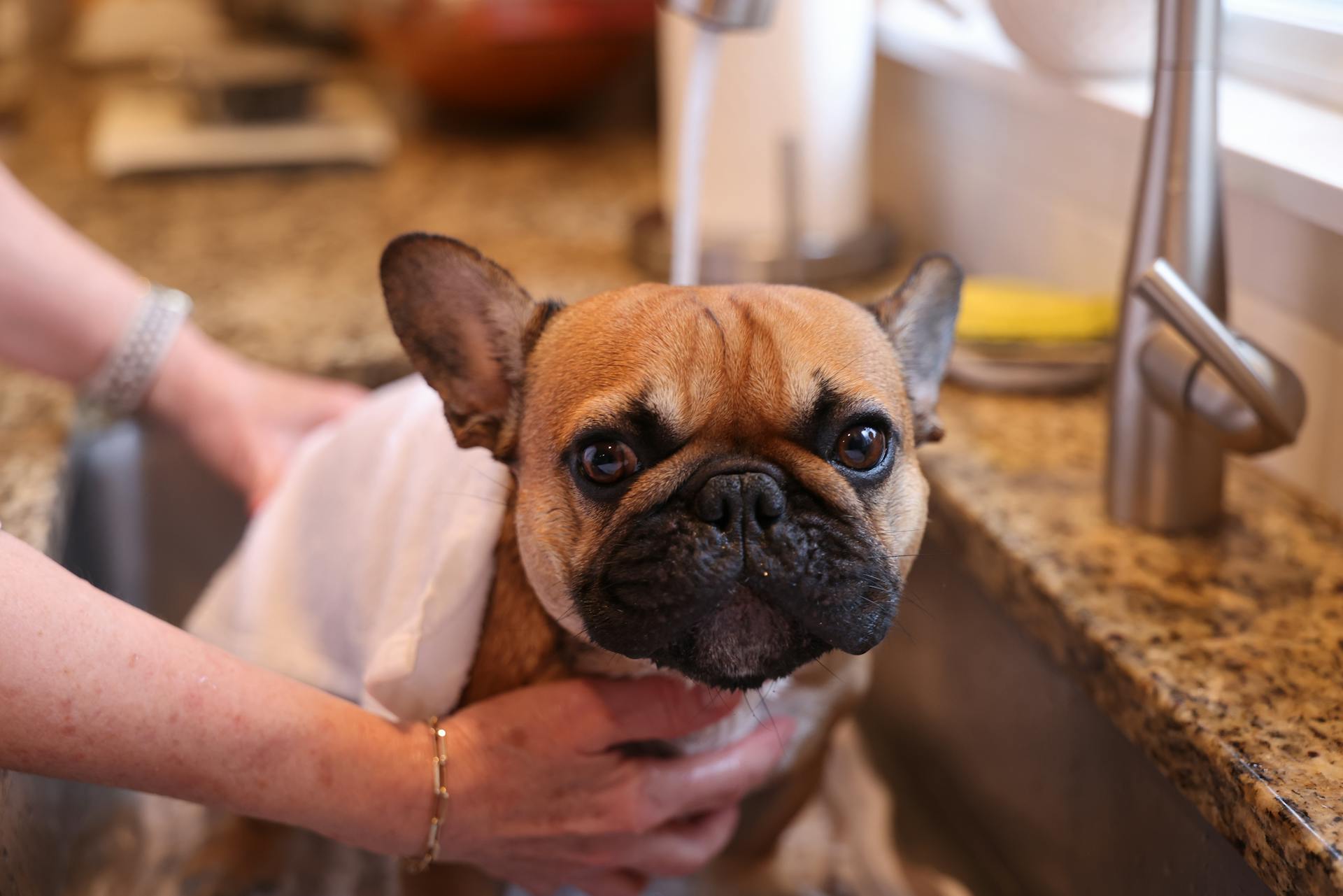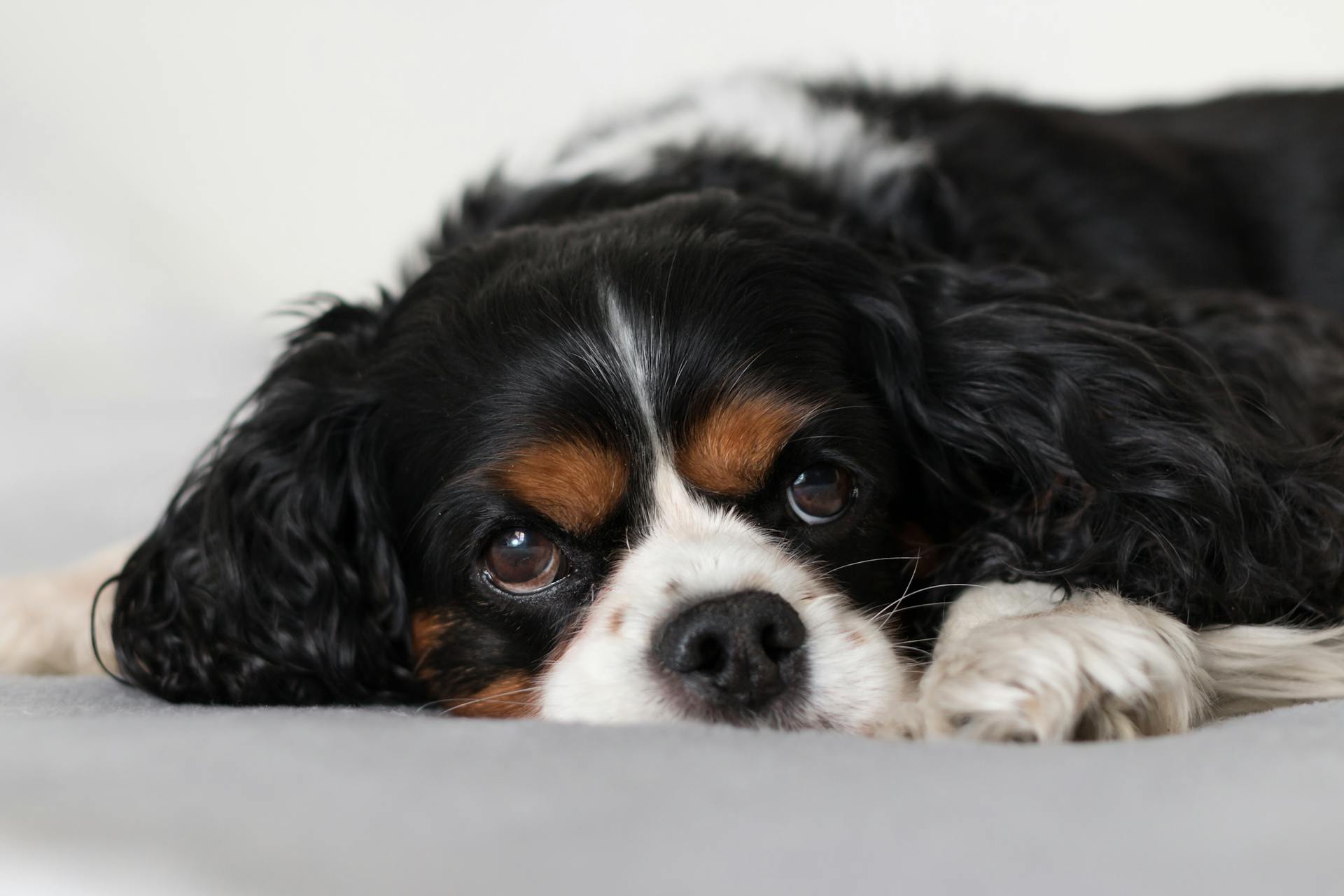
The Havanese is a small, playful dog breed that thrives on human interaction. They typically weigh between 7-13 pounds and stand 8.5-11.5 inches tall.
Their silky, fine coats require regular grooming to prevent matting and tangling. This includes daily brushing and regular trimming to keep their fur looking its best.
Havanese dogs are known for their friendly and outgoing personalities, making them a great fit for families with children. They are also highly intelligent and trainable, responding well to positive reinforcement techniques.
In terms of exercise, Havanese dogs need regular walks and playtime to stay happy and healthy, but they don't require a lot of strenuous activity. A daily 30-minute walk and some playtime indoors should suffice.
Physical Characteristics
Havanese full-grown dogs are truly adorable, and their physical characteristics are just as charming. They typically weigh between 7 and 13 pounds.
Their height ranges from 8 1/2 to 11 1/2 inches, which makes them "toy" size dogs. The Havanese have a sturdy body that is slightly longer than tall.
Their long, soft double coat is one of their most distinctive features, and it feels like silk to the touch. It's often straight or wavy, and it comes in a wide range of colors.
Here are the many colors you can find in a Havanese's coat:
- White
- Black
- Black & Tan
- Black & Silver
- Cream
- Chocolate
- Gold
- Silver
- Fawn
- Blue
- Red
- Red Sable
- Red Brindle
- Gold Brindle
- Silver Brindle
- Black Brindle
- Fawn Brindle
- Blue Brindle
- Chocolate Brindle
- Black and Silver Brindle
- Black and Tan Brindle
- Gold Sable
- Fawn Sable
- Silver Sable
- Chocolate Sable
Their large, dark brown eyes are truly expressive, and they seem to glint with a hint of mischief.
Temperament and Needs
Havanese dogs are naturally outgoing and love to be around people, making them a great fit for families and seniors alike.
They're intelligent and eager to please, which means they're easy to train and can learn new tricks in no time.
With proper socialization and training, Havanese dogs can thrive in any environment, from a studio apartment to a sprawling mansion.
They're not high-maintenance when it comes to exercise, but they do need daily attention and playtime to stay happy and healthy.
A 30-minute walk or some playtime in a fenced-in yard is all they need to get the exercise they require.
If left alone for too long, Havanese dogs can get bored and start barking, so it's essential to provide them with plenty of attention and interaction.
Temperament and Personality
The Havanese temperament is a major draw for many potential owners. They're affectionate, intelligent, and happy dogs that thrive on attention from their owners.
Havanese dogs are quite active and love to play games and learn new tricks. This means they need regular exercise and mental stimulation to prevent boredom and destructive behavior.
Their cheerful and outgoing nature makes them an ideal pet for retired seniors and families with children. They're good with kids and other pets, especially if those pets are non-aggressive.
As small dogs, Havanese are naturally good watchdogs, but they're not suited for guarding due to their size. Without proper training, they may bark excessively, which can be a problem if you live in an apartment or have noise restrictions.
Despite their small size, Havanese have a confident bark and will alert their family to potential threats, including the mailman. Early socialization and positive reinforcement training can help them feel more comfortable around new people and situations.
Intriguing read: Do Boxer Dogs Bark a Lot
Living Needs
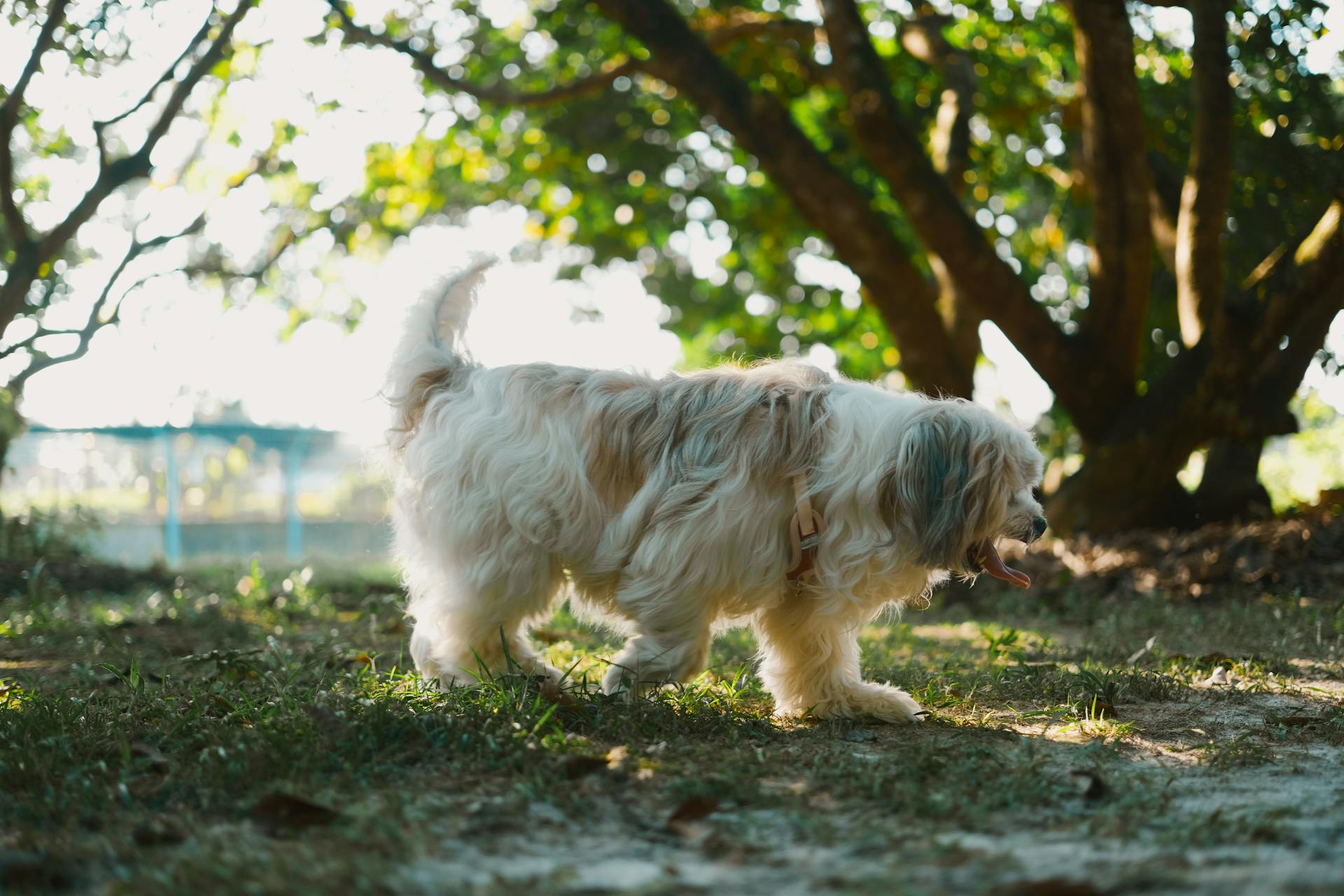
Living in a studio apartment or a sprawling mansion, Havanese dogs are adaptable to any living situation. They just want to be with their people.
These sociable animals thrive on companionship and love being in a lap, which is why they're an excellent choice for seniors, families, and anyone looking for a constant companion. They're not picky about their living space.
If left alone for long periods, Havanese pups can get bored and start barking, which is why regular playtime and attention are a must. They'll like to stretch their legs on a daily 30-minute walk or playtime in a fenced-in yard.
A daily 30-minute walk or playtime in a fenced-in yard is enough exercise for these dogs, as they get the workout they need just by bouncing around the house.
Care and Health
The Havanese is a relatively healthy breed, but like all breeds, they can be prone to certain health issues. They have a lifespan of 14-16 years, which is quite impressive.
Daily grooming is crucial for Havanese dogs to prevent matting and tangling of their beautiful coat. They need to be brushed a few times a week, and some owners opt to get their hair trimmed or corded to save time and effort.
Havanese dogs are prone to hip dysplasia, patellar luxation, and hypothyroidism, which can cause pain, lameness, and weight gain. They are also susceptible to cataracts, especially in older members of the breed.
Regular nail trimming, occasional baths, and ear cleaning are essential to keep your Havanese clean and healthy. It's also crucial to wipe their eyes daily to prevent tear stains.
Here are some common health issues that can affect Havanese dogs:
- Hip dysplasia
- Patellar luxation
- Hypothyroidism
- Cataracts
- Deafness
- Elbow dysplasia
- Eye disorders
- Heart disease
- Bone and joint issues
- Dental issues
- Allergies
Care
Daily grooming is critical for Havanese dogs, as their flowing coat requires regular brushing to prevent mats and tangles. Brushing a few times a week is a must to keep their fur in good condition.
To save time and effort, some owners opt to get their Havanese's hair trimmed or corded. This can be a great option for busy owners who want to minimize grooming time.
A different take: Havanese Grooming Styles
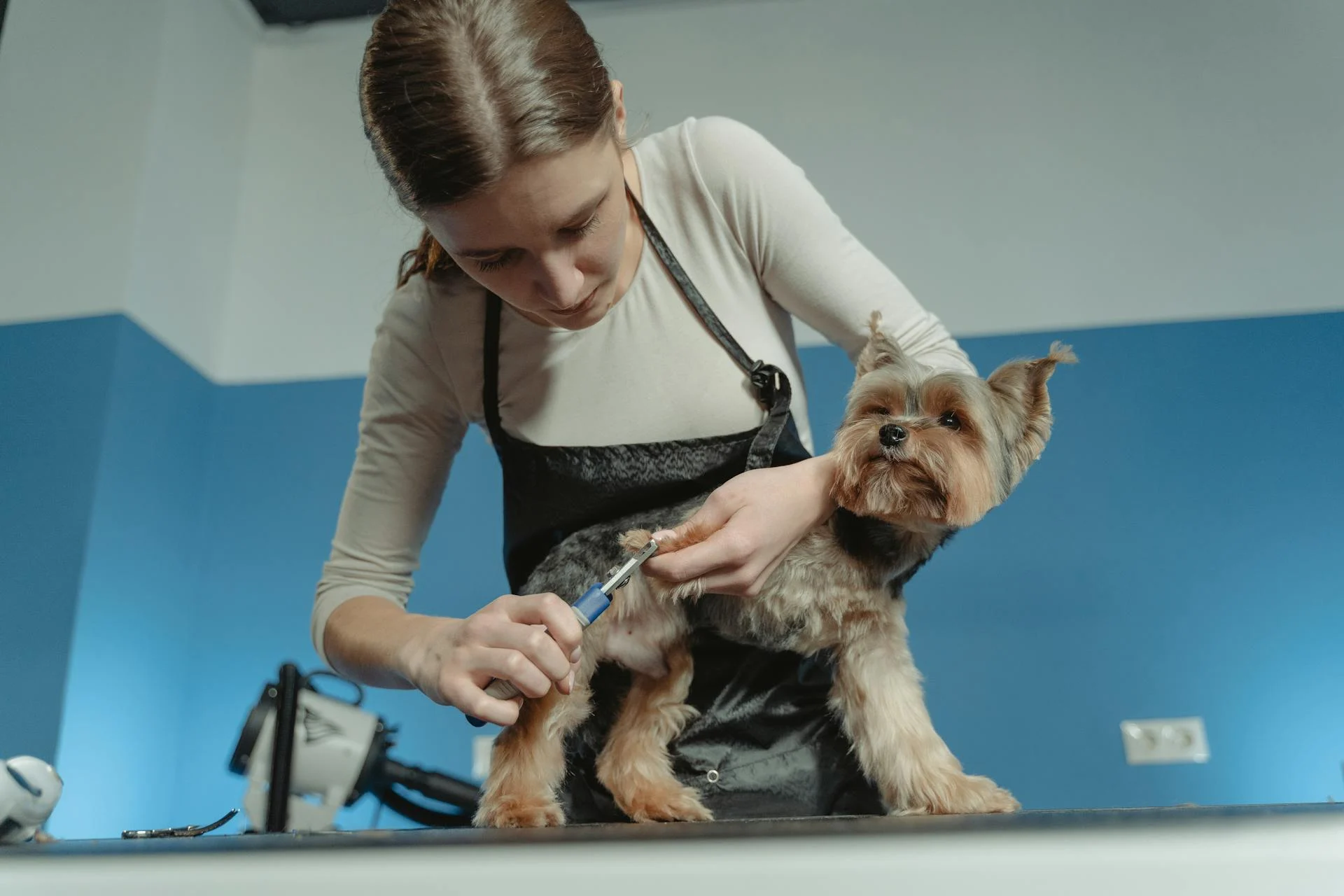
Havanese shedding is surprisingly low, so you won't have to worry about flying fur. However, their high-maintenance coat still requires regular care.
Regular nail trimming is essential to prevent overgrowth, which can be painful for your Havanese. Occasional baths are also necessary to keep them clean and fresh.
Cleaning their ears and wiping their eyes daily can help prevent tear staining. It's a simple task that can make a big difference in your Havanese's comfort and appearance.
Here's a quick rundown of the daily grooming tasks you'll need to perform:
- Brush their coat a few times a week
- Trim their nails regularly
- Give them occasional baths
- Clean their ears and wipe their eyes daily
Diet and Nutrition
When it comes to feeding your furry friend, it's essential to get it right.
Havanese dogs should have about one-half to one full cup of dry dog food distributed into two daily meals.
Some breeds can be prone to getting overweight, so it's crucial to avoid giving your Havanese dogs human foods and leaving out food for free-feeding.
Treats should be given in moderation.
Additional reading: Havanese Feeding Chart
Common Health Problems

The Havanese is generally a healthy breed, but like any breed, they can be prone to certain health issues.
Hip dysplasia, a condition that affects large breeds, is also common in Havanese dogs, causing pain and lameness. Elbow dysplasia is another issue that can arise.
Patellar luxation, a condition where the kneecap slips out of place, is common in small breeds like the Havanese. Deafness is often a congenital condition in this breed.
Hypothyroidism, an underactive thyroid gland, can cause weight gain, lethargy, and skin changes. Cataracts, a cloudiness of the eye, can cause vision loss, especially in older Havanese dogs.
Allergies, particularly skin allergies caused by pollen, grass, and fleas, are common in the Havanese breed.
Here's a quick rundown of common health issues affecting the Havanese breed:
- Hip dysplasia
- Elbow dysplasia
- Patellar luxation
- Deafness
- Hypothyroidism
- Cataracts
- Allergies (skin allergies)
Average Lifespan
Living a long and healthy life is crucial for our furry friends. The average lifespan of a Havanese is 14.5 years, with some living up to 16 years old.
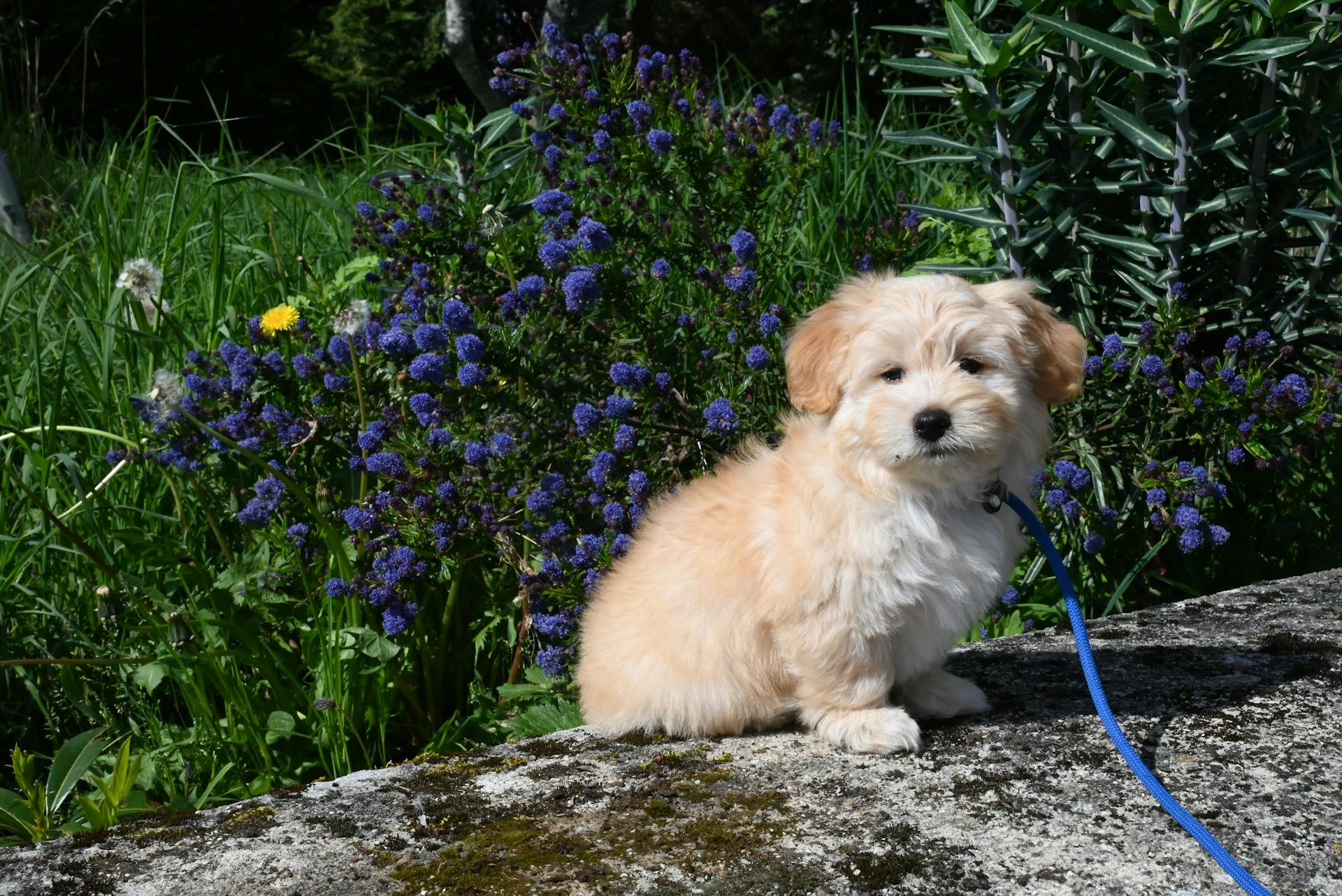
Females tend to outlive males by about a year. With proper care, exercise, and diet, many Havanese can live longer than their average lifespan.
To ensure your Havanese lives a long and happy life, it's essential to provide them with the right amount of care. Regular veterinary check-ups and a balanced diet will go a long way in maintaining their health.
See what others are reading: Mini Long Haired Dachshund Full Grown
Training and Lifestyle
As a Havanese owner, you'll be happy to know that these dogs are extremely intelligent and eager to please, making them a joy to train.
They respond best to positive training methods, which is great news for owners who want to avoid negative reinforcement.
Early socialization is crucial to prevent your Havanese from becoming timid, so be sure to expose them to new people, places, and experiences from an early age.
Havanese dogs have moderate exercise needs, which means daily walks or playtime in the backyard are a must.
Their energetic nature means they need regular physical and mental stimulation to prevent boredom and destructive behavior.
If your Havanese is panting or struggling to keep up with you during exercise, it's time to head home and take a break.
General Information
The Havanese is a small, playful dog breed that typically weighs between 7-13 pounds and stands 8.5-11.5 inches tall at the shoulder.
They have a medium-length coat that requires regular grooming to prevent matting and tangling.
Their lifespan is around 12-15 years, making them a long-term companion.
They are known for being friendly, outgoing, and affectionate, but can be wary of strangers if not socialized properly.
Their intelligence and trainability make them a great breed for first-time dog owners.
See what others are reading: Short Haired Havanese
Frequently Asked Questions
Can a Havanese weigh 20 pounds?
Yes, a Havanese can weigh 20 pounds or more, although this is considered heavier than average. Some Havanese dogs may exceed the typical weight range due to individual characteristics.
Can Havanese be 20 pounds?
Yes, some Havanese dogs can weigh 20 pounds or more, although this is less common. This larger size is still within the breed's normal range.
How much do full grown Havanese weigh?
Full-grown Havanese typically weigh between 7 to 13 pounds.
Featured Images: pexels.com

